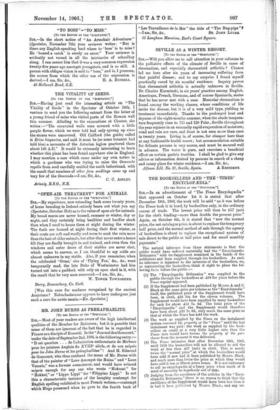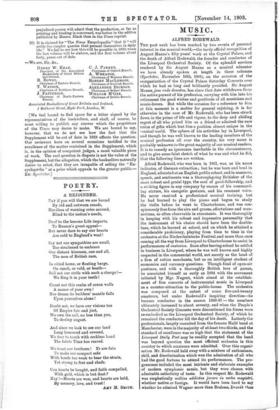THE BOOKSELLERS AND " THE TIMES' ENCYCLOP.EDLA.."
[TO THE EDITOR OE THE "SPECTATOR."] Srn,—In an advertisement of " The Times Encyclopedia" that appeared on October 1st it is stated that after December 19th, 1903, the work will be sold " as it was before the Times took it in band, by booksellers only, in the ordinary course of trade. The lowest price will then be £57 (net) for the cloth binding—more than double the present price." Again, on October 4th, it is stated that " now the normal price, the net catalogue price, is about to replace the temporary half price, and the normal method of sale through the agency of booksellers is about to replace the exceptional system of sale direct to the public at half price and for small monthly
payments."
The natural inference from these statements is that the public would have suffered materially had the "Encyclopedia Britannica" with its Supplement remained in the hands of the publishers and been supplied through the booksellers. As such an inference is injurious to the interests of the booksellers, we, RS representing the booksellers, think it right to place the fol- lowing facts before the public :- (1) The "Encyclopedia Britannica" was supplied to the public through the booksellers at £18 for years before the Times reprint appeared.
(2) If the Supplement had been published by Messrs. A. and C. Black at the same price per volume as the " Encyclopedia" itself, the published price of the Supplement would have been, in cloth, £16 10s. for the eleven volumes. The Supplement would have been supplied by many booksellers for cash for about £12 7s. 6d. The total price of the " Encyclopedia " and the Supplement would therefore have been about £30 7s. 6(1., very much the same price as that at which the Times has sold the work.
(3) The work as supplied by the Times on the instalment system remained the property of the "Times" until the last instalment was paid : the work as supplied by the book- sellers on credit at a very little higher rate than the Times rate would have become the property of the pur- chaser from the moment it was delivered.
(4) The Times intimates that after December 19th, 1903, until 1919 the booksellers will not be allowed to sell the work at less than .257 (net) in cloth. This is nearly twice the "normal price" at which the booksellers would have sold it now had it been published by Messrs. Black, and much more than twice the price at which they would have sold it ten or fifteen years hence. It is not customary to sell an encyclopedia at a fancy price when much of it must of necessity be hopelessly out of date.
(5) Judging from the excellence of the articles in the " Ency- ' clopmdia Britannica," there is no reason to think that the excellence of the Supplement.would have been less than it is had it been published by Messrs. Black; and any un-
prejudiced person will admit that the production, so far as printing and binding is concerned, was better in the edition published by Messrs. Black than in the Times reprint.
(8) It is claimed for "The Times Encycloptedia" that it "will settle the simpler queries that present themselves in daily life." We fail to see how this will be possible in 1919, when the last volume will be sixteen, and the first volume about forty, years out of date.
—We are, Sir, &c.,
HENRY W. KEAY, President of the Associated Booksellers of Great Britain and Ireland.
R. BOWES,
Chairman of Eastern Branch. T. WATSON, Chairman of Northern Branch. J. PATTERSON,
Chairman of North-Eastern Branch.
C. J. PARKER, Chairman of Oxford Branch. A. WHEATON,
Chairman of Western Branch. ROBERT MACLEHOSE, Chairman of Scottish Branch. ALEXANDER DICKSON. Chairman of Belfast Branch. WILLIAM M`GEE, Chairman of Dublin Branch.
Associated Booksellers of Great Britain and Ireland, 1 Bathurst Street, Hyde Park, London. W.
[We feel bound to find space for a letter signed by the representatives of the booksellers, and shall, of course, be most willing to publish any answer which the proprietors of the Times may desire to make. We are bound to say, however, that we do not see how the fact that the Supplement will be out of date in 1919 affects the question. Our reviewers have on several occasions testified to the excellence of the matter contained in the Supplement, which is, in the opinion of competent judges, a most valuable piece of work. The real question in dispute is not the value of the Supplement, but the allegation, which the booksellers naturally desire to rebut, that they are incapable of selling the " En- cyelopgedia " at a price which appeals to the greater public.— En. Spectator.]















































 Previous page
Previous page